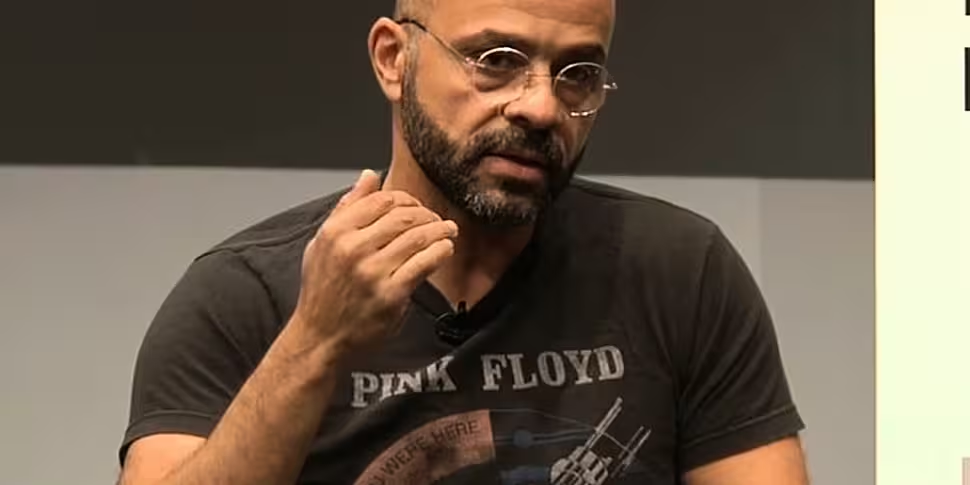As contended countries go, Ireland isn't the worst, ranked 15th in this year's World Happiness Report.
We're faring better than the Germans, Belgians and British when it comes to having a sunny disposition, sure, but there's always room for improvement.
We are, for example, lagging behind the Americans, Danes and Swiss, and we've a long way to go before we supplant Norway as the world's happiest country.
With that in mind, Mo Gawdat is here to help in as logical a manner as possible.
The chief business officer at Google [X] joined Moncrieff this week to talk about how he went from utterly miserable to positively chipper, as well as the formula for doing so which he created along the way and can, he claims, can be adopted by almost anybody.
Essentially, it boils down to reining in your unrealistic expectations.
So, while science can solve many problems – can it really be extended into something as amorphous and subjective as happiness?
'I did not have the option of therapy'
The 49-year-old entrepreneur and author of Solve for Happy began by detailing the inner turmoil he felt as a younger man while it outwardly seemed like he was on top of the world, thriving at Microsoft and IBM.
"I was absolutely miserable in my early 30s," Gawdat admitted. "I was very successful at the time. I achieved what most strive to achieve in terms of wealth and success, and the more life blessed me, I became more and more unhappy...
"Being Middle Eastern and living in the Middle East, I did not have the option of therapy. So I had to read myself out of the issue of my unhappiness.
"It was really difficult for because of my engineering mindset. I could not find the available literature satisfying for my curiosity about what problem I was actually solving – what algorithm I could follow to find my happiness?"

Taking a data-driven approach, over the course of 12 years Gawdat developed a "very solid and repeatable" formula that he says "made me find my happiness for several years to come".
The strength of his theory was tested utterly when his son Ali died suddenly in 2014. Words from his departed spurred him on:
"His request to me was 'Papa, you should never stop working. Keep making a difference and rely on your heart more often. Your work here is not done.'"
Just 17 days after the tragedy, Gawdat started writing his book, resolving to share his route to true contentment with as many people as possible.
The happiness algorithm
And if you've been skim-reading this until that all-important equation was revealed, here it is:
Happiness, Gawdat concluded, is equal to or greater than the events of your life, minus your expectation of how life should be.
Problems arise when we reflect on the events of our life in an inaccurate manner, with Gawdat putting together the '675 model' to outline how we often fail to be truthful when it comes to the past.
The six illusions that distort our reality are:
- believing we are our thoughts
- our sense of self (that you are your body, name, achievements, family, possessions and more)
- knowledge
- an obsession with time
- control
- fear
While Gawdat acknowledges that "some of us are wired differently" when it comes to matters of mental health, he said that the model "really works" for "the majority of us that are engaged in day-to-day life, getting stuck in traffic and trying to be successful at work, what I call the modern-day warriors..."
It does so because it analyses "what went wrong with the machine that is your physical form".
Gawdat continued:
"Very systematically, it tells you that if you remove what you've learned to cope and deal with the modern world as it is and succeed in it... what's left behind is happy."
It's not just a solution for those in the developed world either, with Gawdat actually believing that people in developing countries seem to "apply it more instinctively" than in richer nations.
Even though they don't have "the latest smartphone", he says that "what they get from life is what they expect" and "accordingly they end up in a place where they feel happy".
Gawdat sympathised with those in truly dire straits, and acknowledged that an orphan in a Sudanese refugee camp doesn't have many reasons to be cheerful, but maintained that the formula could provide some solace even in the worst of circumstances.
"Life will be harsh on each of us in a very different way," he said. "Each of us will get some kind of a challenge."
Allowing unhappiness to flourish, however, "doesn't make your chances of surviving the situation better."
Returning to Irish shores, he said:
"The truth is, if you're listening to this show in Ireland, then you are okay. If you want to know what difficult and harsh is, go to Syria, go to Sudan... and you will realise that we're all so blessed, we're probably some of the luckiest people alive."
"As long as you look at the empty part of the glass," he concluded. "There's always going to be something missing."
Hear the full interview below, in which Gawdat also gives his "mathematical" rationale for believing the universe has a designer...









